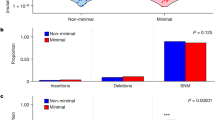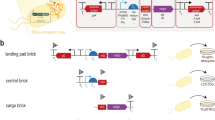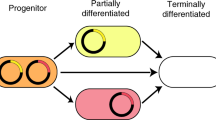Abstract
QUANTITATIVE mass conversion of bacteria to protoplasts and unstable L phase variants and the reverse process are probably not mutational events. The transition from unstable L phase variants to stable L phase variants, however, probably reflects a fundamental genetic change, although this is still in dispute1. Increasing circumstantial biochemical data support this but genetic evidence is virtually non-existent. Several stable L phase variants, when compared with the protoplasts or bacteria from which they were derived by non-mutational induction procedures, are lacking in certain wall components2,3 and part of the DNA4, and possibly defective in stages of wall biosynthesis5,6, and to possess altered membrane constituents7,8, all of which may reflect an inability to carry out proper wall formation.
This is a preview of subscription content, access via your institution
Access options
Subscribe to this journal
Receive 51 print issues and online access
$199.00 per year
only $3.90 per issue
Buy this article
- Purchase on Springer Link
- Instant access to full article PDF
Prices may be subject to local taxes which are calculated during checkout
Similar content being viewed by others
References
Smith, P. F. (edit.), in The Biology of Mycoplasmas, 16 (Academic Press, New York, 1971).
King, J. R., Prescott, B., and Caldes, G., J. Bact., 102, 296 (1970).
Sharp, J. T., J. Bact., 86, 692 (1963).
Hoyer, B. H., and King, J. R., J. Bact., 97, 1516 (1969).
Chatterjee, A. N., Ward, J. B., and Perkins, H. R., Nature, 214, 1311 (1967).
Panos, C., and Cohen, M., Biochim. biophys. Acta, 117, 98 (1966).
Cohen, M., and Panos, C., Biochemistry, 5, 2385 (1966).
Ward, J. B., and Perkins, H. R., Biochem. J., 106, 391 (1968).
Wyrick, P. B., and Rogers, H. J. (submitted. J. Bacteriol., 1973).
Marmur, J., J. molec. Biol., 3, 208 (1961).
Karamata, D., and Gross, J. D., Molec. gen. Genet., 108, 277 (1970).
Gooder, H., in Microbial Protoplasts, Spheroplasts and L-forms (edit. by Guze, L. B.), 40 (The Williams and Wilkins Co., Baltimore, Md., 1968).
King, J. R., and Gooder, H., J. Bact., 103, 692 (1970).
Spizizen, J., Proc. natn. Acad. Sci. U.S.A., 44, 1072 (1958).
Landman, O. E., and Halle, S., J. molec. Biol., 7, 721 (1963).
Young, F. E., and Wilson, G. A., in Spores (edit. by Campbell, L. L., and Halvorson, H. O.), 5, 77 (American Society for Microbiology, Ann Arbor, Michigan, 1972).
Author information
Authors and Affiliations
Rights and permissions
About this article
Cite this article
WYRICK, P., MCCONNELL, M. & ROGERS, H. Genetic Transfer of the Stable L Form State to Intact Bacterial Cells. Nature 244, 505–507 (1973). https://doi.org/10.1038/244505a0
Received:
Issue Date:
DOI: https://doi.org/10.1038/244505a0
Comments
By submitting a comment you agree to abide by our Terms and Community Guidelines. If you find something abusive or that does not comply with our terms or guidelines please flag it as inappropriate.



